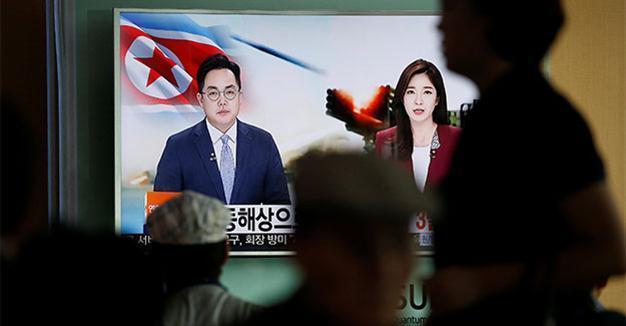N Korea test-fires three ballistic missiles: Seoul
SEOUL

Passengers watch a TV screen broadcasting a news report on North Korea firing three ballistic missiles into the sea off its east coast, at a railway station in Seoul, South Korea, September 5, 2016. REUTERS photo
North Korea on Sept. 5 fired three suspected medium-range Rodong missiles that travelled about 1,000 kilometers and landed near Japan in an apparent show of force timed to the G-20 economic summit in China, Seoul officials said.
The missiles were fired into the Sea of Japan (East Sea) from the North’s Hwangju county at around 03:00 a.m. GMT, a spokesman for Seoul’s Defense Ministry said.
The saber-rattling follows the North’s submarine-launched ballistic missile test some two weeks ago.
“They are speculated to be Rodong missiles with a range of 1,000 kilometers and were fired without navigational warning to Japan,” the spokesman said in a statement, according to AFP.
“North Korea’s ballistic missile launch is a direct violation of U.N. Security Council resolutions, aimed at showing off its nuclear and missile capabilities during the G-20 Summit,” he added.
The Defense Ministry in Tokyo said the three missiles are estimated to have fallen into Japan’s maritime Exclusive Economic Zone.
“The ministry expresses serious concern over the missile launches as they pose a grave threat to Japan’s national security,” a ministry statement said.
The North’s latest tests sparked strong protests from senior Japanese and U.S. officials.
The launches “are a grave security provocation and can never be permitted,” Japanese Foreign Minister Fumio Kishida told reporters in Tokyo.
“We have lodged a strong protest against North Korea.”
A senior U.S. administration official at the G20 in Hangzhou also condemned the launches as a threat to its allies and to civilian air travel, and vowed diplomatic action against the Pyongyang regime.
“Today’s reckless launches by North Korea pose threats to civil aviation and maritime commerce in the region,” the official said.
Washington would try to “bolster international resolve to hold the DPRK [North Korea] accountable for its provocative actions.”
The Sept. 5 missile launches came hours after South Korean President Park Geun-Hye and Chinese President Xi Jinping met on the sidelines of the summit in Hangzhou.
Ties between South Korea and China have been frosty since Seoul announced plans to deploy a U.S. anti-missile system in July to counter growing nuclear and missile threats from the North.
During the summit, Xi reiterated Beijing’s opposition to Seoul’s planned deployment of the Terminal High Altitude Area Defense (THAAD) system, arguing that “mishandling” the issue could “intensify disputes” in the region, China’s state-run Xinhua news agency said.
Park labelled North Korea’s continued provocations as a “challenge” to Seoul-Beijing ties, adding that security threats from Pyongyang were at an “unprecedented level,” South Korea’s Yonhap news agency said.
